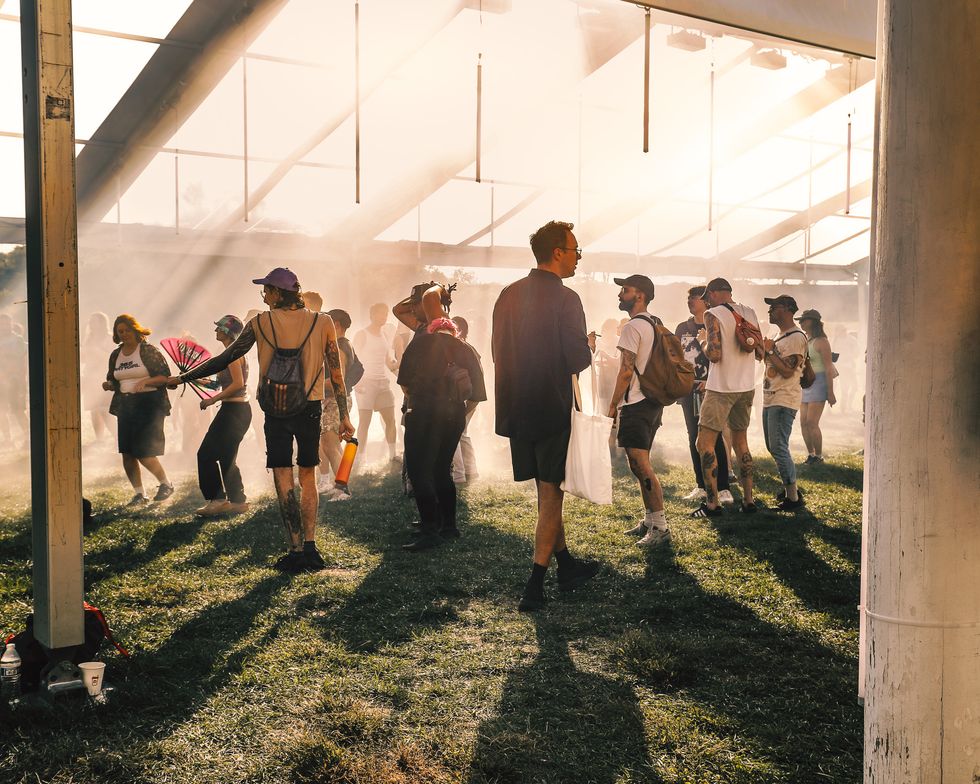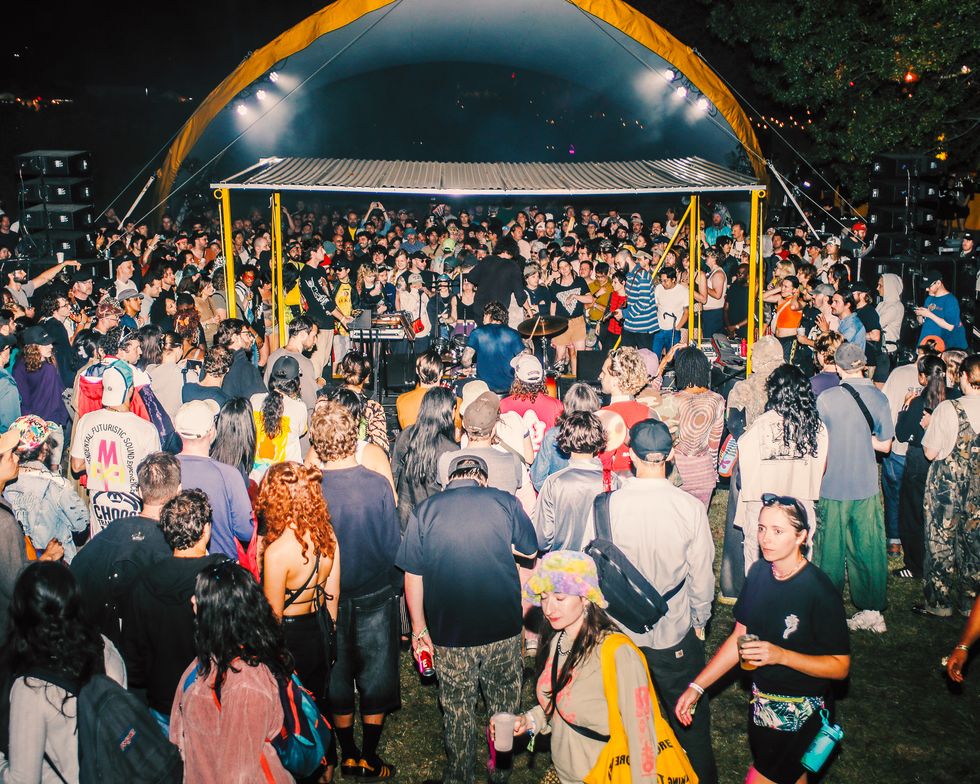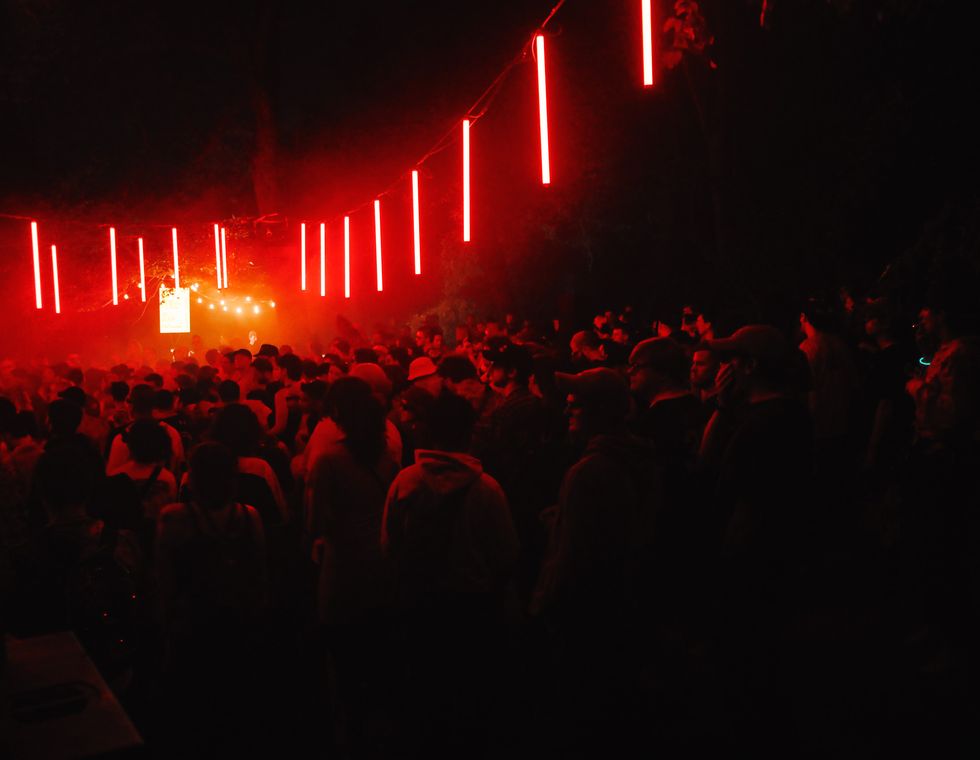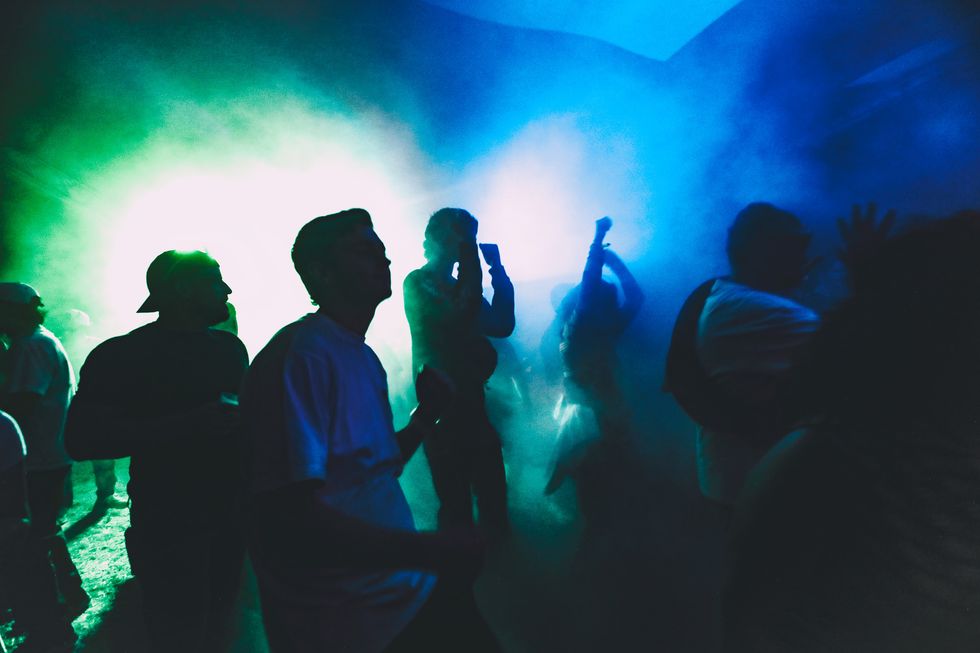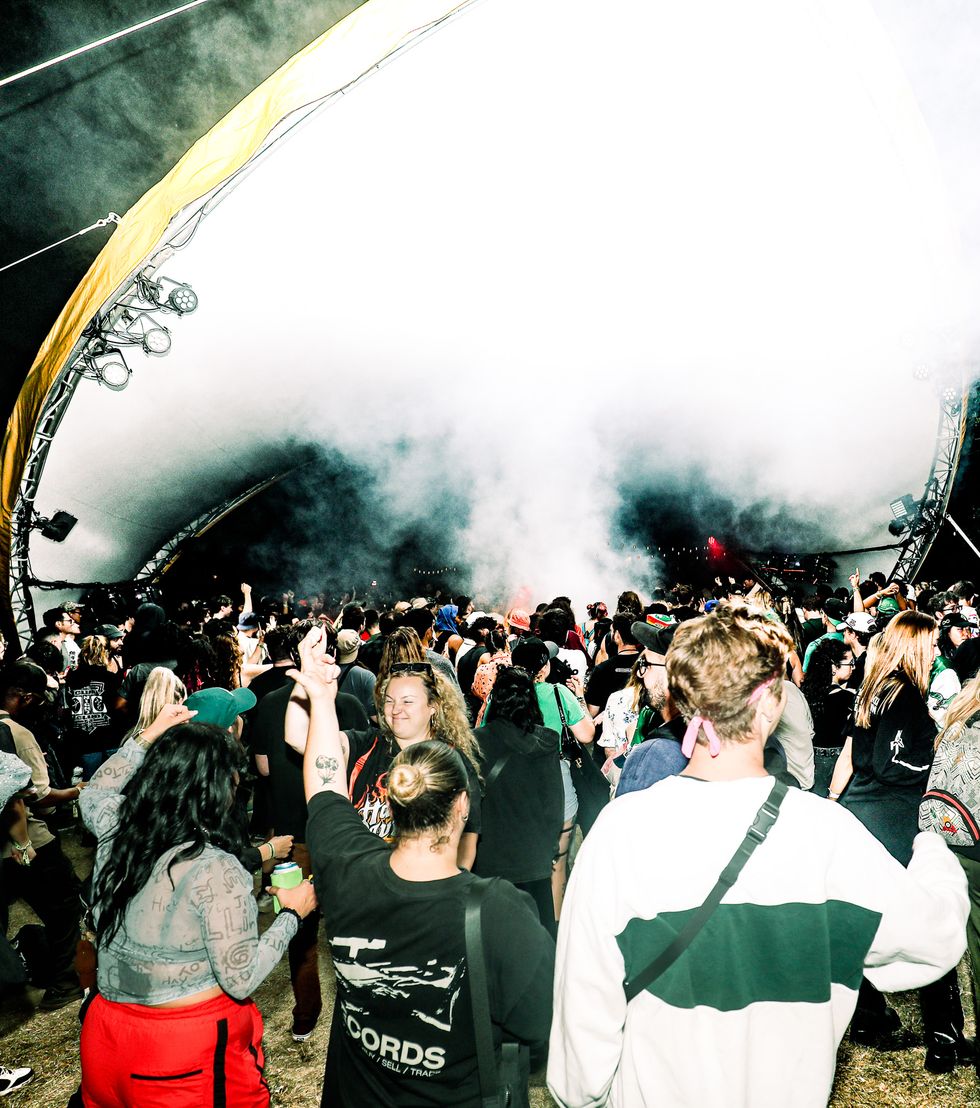
Dave P. is Still 'Making Time'
By Tobias Hess
Sep 24, 2025“Dave P.”
Whispers of the Philly iconoclast were as omnipresent at Making Time ∞ as the roar of planes landing beside us, or the steady buzz of bugs and critters emanating from the surrounding bog. That’s to say nothing of the music — the serene, slamming and cerebral bits of sonics that make up these three days of auditory transcendance, all organized by the aforementioned Dave P., a local promoter and DJ whose role in the festival straddles somewhere between booker, chief organizer, and guiding philosopher.
All official festival communications are heavily emblazoned with messages of PLURT, that is “Peace, Love, Unity, Respect and Transcendence," and are written in Dave P.’s reverential and passionate textual style, filled with creative capitalization and inspired pronouncements.
The philosopher-in-chief has been throwing Making Time parties for 25 years in Philly, before it became a festival in it’s fifth iteration. His claims to fame include being the first U.S. promoter to book Charli xcx over 13 years ago, but locals simply know him as the recognizable bespectacled figure who has become enmeshed in Philly’s music scene.
People come from near and far for Dave P.’s diverse bookings, but also for its singular location; it takes place at Fort Mifflin, a revolutionary war bunker built on a mud island alongside the Delaware River, which now sits next to Philadelphia’s gargantuan International Airport (hence the planes landing eerily close). The location, then, is filled with eccentricities and quirks, from its odd blend of the natural and mechanic, to the real spectre of ghosts (it served as a military prison during the Civil War and Dave P. describes it as “haunted as fuck”). It’s also literally sinking and requires tremendous upkeep to stay above water, both literally and financially.
“I have a pump that’s pumping the moat into the Delaware River because it overflows, and then I have another pump because there's water coming in through an 18th century stone drain,” Dave P. tells PAPER during a quick reprieve from the music on Sunday. “This fort doesn't get any funding from the city, so [Fort Mifflin] don't have the money to do this. Luckily the airport is now working with the fort on helping them build new tide gates [which control the surrounding water],” he shares. “That's honestly crucial to this event because we can't continue to spend this money on the grounds.”
Making Time ∞ is thus facing the dual challenges of finding financial stability within a live music ecosystem that is facing rising costs on all fronts, as well as contending with the climatic realities of the rising waters around it — a challenge which Dave P. is eager to tackle. “This event isn't the same somewhere else. It has to be here,” he says.
There’s many reasons to relate to his tenacity and heartfelt attachment to the place, and the festival he has built in these strange and hallowed grounds. At Making Time ∞, an attendee can see Joanne Robertson in the humid, dim interior of a stone bunker, or reach transcendence while moving to DJs Juliana Huxtable, Upsammy or DJ Nobu at the festival’s new forest stage, Option 5. One can find thrashing elevation while moshing to YWHH Nailgun waterside by the Delaware River, or bask in the misty reverence of seeing Four Tet play the festival’s largest stage, Transcendental Zone. Meanwhile, the Lot Radio Zone is pumping all weekend with favs like x3Butterfuly, Nick León or Traxman on the decks.
“I wanted to be able to create this limitless, genreless, very open experience … something with no limitations,” says Dave P. Indeed, as one floats between worlds and disparate environments, one has the feeling of drifting through some strange dreamscape. Lost in that ether, I suppose you truly can reach PLURT.
PAPER chatted with Dave P. during a quick break from the madness on Sunday to discuss the realities of running a sprawling festival, the Philly scene, and staying above water.
How are you feeling on day 3?
I'm tired to be honest. I haven't got much sleep. On Friday night I didn't sleep at all and I had to go straight through. Last night, I got two hours of sleep, so I'm a bit tired, but I'm also really happy. [The festival this weekend is] exactly what I always wanted it to be.
What makes it everything you want to be specifically this year?
There's so many pieces that complete the vision, from the number of stages, the production, the sound, the lights, the way we utilize the space, the balance of live artists with DJs. One of the big goals that I had from the beginning was to have more live artists. Making Time ∞ is the festival and the year round parties are Making Time, so when I started Making Time, the events had bands with DJs. Slowly they evolved into events where there were mostly DJs. That was a sign of the times. I just wasn't into a lot of bands at that time and a lot of this is dictated by what I like.
But I wanted to get back to having that balance of bands and DJs and Making Time ∞ gives me the opportunity to do that because there's no limitations here [at this festival]. I can do whatever the fuck I want, whereas in a club there are so many limitations of time and space, and it's a party, so everybody wants to party and dance. Here I have the ability to do a chill out room, a room with live experimental electronic artists and then I have bigger bands playing the main stage. I was able to do that this year and have that balance of live acts and DJs, and have people enjoy it. To actually have it work is really satisfying.
How do you quantify success?
You just watch people. There are moments and certain transitions that I have in my mind that I think will work. Last year, the big one was that I had Caterina Barbieri play smack dab in the middle of a bunch of DJs. It was incredible. This year, we had Ben UFO, Aya, VTSS, Boy Harsher and then ¥ØU$UK€ ¥UK1MAT$U [play back to back on the same stage]. Ben UFO said to me after he finished, “This was perfect." It's a progression. I program the schedule and the lineup almost like a DJ set. When I'm DJing, I'll start off ambient. Then I'll start playing [music that is] 90 BPM, and then 110, 120 … by the end I'm playing slamming techno and that's how I program the lineup, but that's in my head.
The success then is the reaction.I see people reacting to [the performances], and it becomes pretty apparent that they like it and and and it makes sense and is working. That's when I realized, “Okay, that worked. Cool.”
The curation is really standing out to me now experiencing this, but also this really special environment. Even having the planes landing right here.
There's so many pieces to this event that make it special. The planes are part of why it works because there's not a noise ordinance, because what's louder than a fucking plane?
I was reading a bit about the history of this specific event. It was initially going to be a 25,000 person festival [in its first year in 2020]. I'm curious, now that you have something that's smaller but still big and maybe a bit more sustainable: how are you thinking about your ambition to do something so big before?
The [event was canceled] because of COVID. We were meant to do this thing at the Navy Yard. It was going to be a more large-scale event with a much broader spectrum of artists. I can book a lot of things that probably would make me a lot of money, but I don't do it because I only book things that I like. If I ended up doing something like [that bigger festival], I probably would have had to go against that booking ethos.I'm very happy that that didn't happen … this [current festival] is everything I ever wanted to do.
Where did that ambition to do something so massive initially come from?
I just always had my ideals of the ideal festival, and that's why I do this. I never found a festival that I fully connected with. There's festivals that I like, but I always see things that I think are missing or things that I want to see happen and that's one of the motivating factors I had in doing this. I wanted to right all the wrongs of all the festivals that I would go to.
Also, I listen to so much music and have such a diverse taste and interest in music that I wanted to be able to do an event that represented the diversity of those interests. The club is not where that can happen. I wanted to be able to create this limitless, genreless, very open experience … something with no limitations. I often get frustrated … Making Time is primarily a party and Making Time ∞ is the festival. But with the parties, I try to experiment with more left field things in the club and sometimes it doesn't work. I get really frustrated with tgar, so I just wanted to have a space where I could really expand what Making Time is and program according to my true interests.
When I said I was coming to this, [all my Philly friends] were like, “Aw you gotta meet Dave P.” It’s rare for a festival to be associated with one person so strongly.
It's a blessing and a curse. It puts a lot of pressure and responsibility on me because of that.
How cognizant are you of building your own personal brand in relation to building the bigger festival?
I don't give a shit about my personal brand [laughs]. If I cared about my personal brand, I wouldn't be doing this event.
But there is “Dave P.” everywhere [in the festival communications].
This is a representation of me. I have my hand in every piece of this. I make the final decisions. I designed the merch with the graphic designer and all the merch. These are my ideas. I choose the food vendors. I book the lineup. The lights are a true collaboration with Klip Collective … they have the vision of the lighting, but we work together and my hand is in it.
Social media is the big one. That's the blessing and the curse. My social media is my voice.I developed it that way from the beginning. It wasn't about making a personal brand. I was just posting things in my voice. I didn't want to make a brand to be a brand. The goal was to just promote my parties and sell some tickets. I'm just being me and being honest. My social media is honest. I'm talking from my own perspective and my own voice, but what sucks is now I can't have anybody else do it.
This is a representation of me and I'm happy that people appreciate and enjoy it. They get to have these experiences and they really appreciate them. But for me, there's a lot of juggling that has to happen to make this work. Because of that, I'm driving this experience.
There's so many crucial people that are doing this. It's by no means [just me]. The first year it was me and this my friend Claire Claus, who's one of the production managers, and we did it ourselves and it was, insane; a much smaller, but now it's growing. We have an amazing staff. We have this incredible team of people that really like doing such a good job to help me create this vision of reality. But in the end, it's my vision, my voice, my taste, my interests. That's a great thing, but it also makes it really hard.
I'm curious to hear your reflections on what this festival means for Philly and the Philly scene?
It's changed Philly in a positive way. I love this city. I grew up here. If I ever wanted to leave Philly, there's not an American city that I want to move to. I'd have to move to Europe because I think Philly is the greatest city in America. The people here are amazing. We have so much amazing culture. Philly gets overlooked, because it's in the shadow of New York. Philly knows [people say,] “New York, New York, New York,” but Philly has just so much going on and there's so much here.
And this event has brought so much attention to Philadelphia and like Philadelphia place in music culture, and pop culture in general. It's an important city in America. This has put Philly on the map in a lot of ways .. there's so many other things in Philadelphia that do that. I would never say we’re solely responsible for that, but [Making Time ∞] shines a light on Philly internationally. There's people from France, Germany, London, Denver, and Montreal. Those people weren't coming here before, so it highlights Philadelphia as a really important city in music and culture.
This is the 5th year of Making Time ∞, what will be needed for 5 more years?
I need to make money! [laughs]
To be more specific then, what’s the biggest financial challenge?
That's huge. How does this continue? How do you make it sustainable? Sustainability is an issue in the music industry and the dance music community in general. Things are more expensive, fees are more expensive, the demands of the music industry on promoters just keeps becoming more and more. I need to have more staff to handle the demands of the music industry for an event. It's getting to a breaking point. It's really hard to make money. This has to become more sustainable, but I can't answer [how] because I don't know.
It's scary. Every year, I go into this like it's going to be possibly the last. I think about the future. I think about what I would like this to be, but I also go into it very focused on the present and really mindful of the present and of the moment. I need to stay focused, but t's not sustainable, and I need to figure out how to make it more sustainable.
There's also a lot of issues with Fort Mifflin itself and the grounds. We do a lot of work on the grounds. Right now we have two pumps. I have a pump over there that’s pumping the moat into Delaware River because it overflows, and then I have another pump because there's water coming in through an18th century stone drain. We made a dam and we have another pump that's sucking all the water out and pumping that out. That's not sustainable. It costs a lot of money … these pumps run on diesel. We've been pumping for a month because the grounds were so soaked. This year there was so much rain.
There's multiple tide gates. They kind of control the flow of water in and out. Those tide gates are destroyed. They need new tide gates. It's a multi-million dollar project. This fort doesn't get any funding from the city, so they don't have the money to do this. Luckily the airport is now working with the fort on helping them build new tide gates.That's honestly crucial to this event because we can't continue to spend this money on the grounds.
It sounds like you’ve invested significant money into the upkeep of the ground, which is wonderful, but given the expense and the precarity of running a festival: why pour so much into this site in the first place?
It's a magical place. It's the best festival site in the world. I can say that with complete confidence. I used to think it, but now I feel very confident saying that this is the best festival site in the world. There's so much here. There's obviously a very rich history. It's haunted as fuck. There's ghosts everywhere that we're all, we're all in the midst of. We're hanging out with them, And there's it's just a beautiful space and there's such a great energy here and I've fallen in love with it. I want to make it work here, because this space is honestly 50% of this event. This event isn't the same somewhere else. It has to be here. I want to make it work, but things need to happen here.
MORE ON PAPER
Cardi B sorprende con una presentación inesperada y deja a todos “Ready Pa’l Show”
Español
Feb 14, 2026
ATF Story
Madison Beer, Her Way
Photography by Davis Bates / Story by Alaska Riley
Photography by Davis Bates / Story by Alaska Riley
16 January
Entertainment
Cynthia Erivo in Full Bloom
Photography by David LaChapelle / Story by Joan Summers / Styling by Jason Bolden / Makeup by Joanna Simkim / Nails by Shea Osei
Photography by David LaChapelle / Story by Joan Summers / Styling by Jason Bolden / Makeup by Joanna Simkim / Nails by Shea Osei
01 December
Entertainment
Rami Malek Is Certifiably Unserious
Story by Joan Summers / Photography by Adam Powell
Story by Joan Summers / Photography by Adam Powell
14 November
Music
Janelle Monáe, HalloQueen
Story by Ivan Guzman / Photography by Pol Kurucz/ Styling by Alexandra Mandelkorn/ Hair by Nikki Nelms/ Makeup by Sasha Glasser/ Nails by Juan Alvear/ Set design by Krystall Schott
Story by Ivan Guzman / Photography by Pol Kurucz/ Styling by Alexandra Mandelkorn/ Hair by Nikki Nelms/ Makeup by Sasha Glasser/ Nails by Juan Alvear/ Set design by Krystall Schott
27 October
Music
You Don’t Move Cardi B
Story by Erica Campbell / Photography by Jora Frantzis / Styling by Kollin Carter/ Hair by Tokyo Stylez/ Makeup by Erika LaPearl/ Nails by Coca Nguyen/ Set design by Allegra Peyton
Story by Erica Campbell / Photography by Jora Frantzis / Styling by Kollin Carter/ Hair by Tokyo Stylez/ Makeup by Erika LaPearl/ Nails by Coca Nguyen/ Set design by Allegra Peyton
14 October

